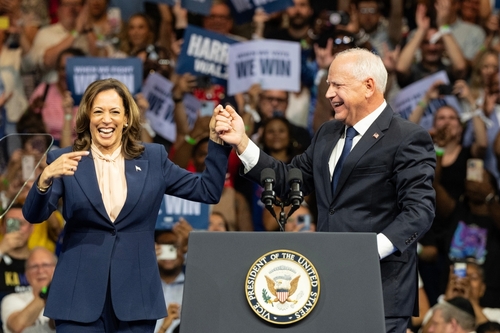Minnesota Governor Tim Walz faces mounting criticism for his administration’s allocation of federal COVID-19 relief funds, which were used on projects unrelated to pandemic recovery. This revelation comes as Walz has been chosen as Vice President Kamala Harris' running mate, bringing renewed attention to his actions during the pandemic.
Reports indicate that significant portions of the $1.9 trillion American Rescue Plan (ARP) funds, which were intended to mitigate the impacts of COVID-19, were instead spent on unrelated expenditures. Notable among these were $4.3 million used to cover parking costs at state facilities for employees and visitors.
NEW: Florida Governor Ron DeSantis shreds Tim Walz for setting up a COVID hotline so neighbors could snitch on each other.
The comment came after Walz said people should “respect” their neighbors and “mind their own d*mn business.”
“He's got this line in the stump speech… pic.twitter.com/Yb4mBMoWGE
— Collin Rugg (@CollinRugg) August 9, 2024
Additionally, $1 million was allocated for a feasibility study on paid family leave, and another $1 million was directed towards a statewide gun safety advertising campaign. These expenditures have raised eyebrows, with critics arguing that they violate the spirit of the relief funds intended for direct pandemic-related needs.
The misuse of these funds does not end there. Over $7.8 million was distributed to two homeless shelters in the Twin Cities, which, while addressing a social issue, did not directly correlate with pandemic recovery efforts. Similarly, nearly $1 million was earmarked for small business development programs targeting minority- and women-owned businesses, and $1.24 million was funneled into Minnesota’s "Grow Your Own" program, which focuses on recruiting teachers and school employees.
A few excerpts from Walz's Covid snitch line, just in case you forgot how insane that was. pic.twitter.com/GXoNPRpOhO
— Nick Majerus (@njmajerus) August 6, 2024
Critics are particularly concerned about larger line items, such as the $11 million allocated to the Minnesota Zoo and $3.8 million to the Science Museum of Minnesota, which were used to cover operating and maintenance costs. While these institutions were undoubtedly impacted by the pandemic, the justification for using federal COVID-19 relief funds for their expenses remains questionable. Other questionable expenditures include a $237,000 allocation for a "movie theater relief grant program," which, although related to pandemic shutdowns, also draws scrutiny for its relevance to urgent public health needs.
The controversy around Walz’s management of the ARP funds is further fueled by the fact that Minnesota had obligated more than 99% of its share of stimulus cash by September 2023. This rapid expenditure raises concerns about the effectiveness and appropriateness of how the funds were used. Some analysts suggest that the ARP funds were treated more like a slush fund than a targeted response to a public health crisis, a sentiment echoed by many Minnesotans and critics alike.
Walz's actions are part of a broader pattern observed in several states where COVID-19 relief funds have been spent on projects that, while potentially valuable, were not directly related to addressing the pandemic. The flexibility provided to states in spending these funds has led to varied interpretations of what constitutes an appropriate use of the money. However, the extent to which Minnesota used these funds for non-pandemic-related expenses has placed Walz's administration under intense scrutiny.
As the debate continues, the question remains whether these expenditures will impact Walz's political future, particularly in the high-stakes arena of national politics. For now, the controversy serves as a reminder of the challenges in ensuring that taxpayer dollars are used as intended, especially during times of crisis.

